
Green Camp
The highest heavens belong to the Lord, but the earth He has given to man.
Psalm 115:16
Part of Falling Creek Camp’s mission is to help boys understand their relationship with nature. Camp is the perfect place to be surrounded by nature - and discover the wonders. It is also a place for boys to learn how to be good stewards of the earth and the environment.
Living & Learning: GREEN
Conservation Easements
Falling Creek has worked to permanently protect over 150 acres of forest land from being developed by using conservation easements.
A conservation easement is a voluntary legal agreement between a landowner and a land trust or government agency that permanently limits uses of the land in order to protect its conservation values.
Land Conservation Alliance
F.A.R.M. Program
F.A.R.M. is an activity at camp that stands for Food, Animals, Repurposing, and Manpower. The boys learn about and participate in projects including multiple forms of composting, rainwater collection for irrigation, alternative forms of energy, caring for farm animals, and planting and harvesting from the garden. They learn transferable skills that can be used in their everyday lives. They gain a better understanding about the importance of their influence on the footprint of the environment. They strengthen the connection they have with food and nature. And we think they leave with a new appreciation for sustainable living.
Leave No Trace
Our staff members teach and practice Leave No Trace concepts while on trips out of camp and on our camp property. Our trips follow the seven Leave No Trace Principles while deciding where to camp, whether to build a fire, how to dispose of food and waste, and any other aspects to minimize their impact. We also use biodegradable soap when in the wilderness.
Intentional Themes
We have morning watches, church themes, and campfire programs during the summer that are focused on being good stewards of the earth and the environment. What better place to learn these lessons than while directly in the middle of it all!
Outdoor Skills Certified (OSC)
In OSC, boys learn outdoor skills and practice outdoor living techniques, using resources in the natural world. The boys gain a greater understanding of how to interact with nature for survival. They practice techniques such as rope-making from natural fibers and bark, starting fires from flint and steel or bow and drill, selecting or building safe shelters, and becoming familiar with edible plants in the wild.
Nature Program
Our Nature activity teaches campers respect for the environment, conservation principles, and living in harmony through hands on learning. Our staff takes advantage of our location to teach the boys about nature and the environment in Western North Carolina.
Planting “Seed Bombs” at the F.A.R.M.
F.A.R.M. stands for Food, Animals, Repurposing, and Manpower. These four areas are what make up the program: we have 15 raised beds for planting, a flock of chickens, lessons on recycling or reusing compost in our black soldierfly larvae tub, and plenty of opportunity for manpower to improve the garden or clean the coop.
More Videos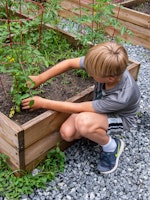

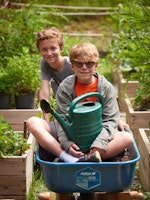
Waste Bins
All of the trash bins around camp and in cabins have three separate bins for recycling, compost, and trash. Every building and cabin is equipped with these three bins, and the boys are encouraged to use the recycling and compost as much as possible. During Cookout Supper or times that we don’t eat in the Dining Hall, all of our cups, forks, napkins, and plates are made from compostable material (either cornstarch polymer or paper), not plastic or styrofoam.
Composting
Campers learn about composting in our F.A.R.M. program through several types of small-scale composting. We also compost all food waste, napkins, and even milk cartons - and our dining hall compost is picked up by a local large-scale composting company.
Recycling
As a camp, we try to practice what we preach year-round by recycling items generated from our normal operations, including paper, cardboard, glass, plastics, batteries, toner, electronics, old tires, and scrap metal. Kitchen oils are stored and picked up by a local biofuel company to be repurposed. When trees fall at camp we use them to make lumber for projects, firewood for our campfires, or leave them to complete their life cycle. We also donate retired furniture and appliances to Habitat for Humanity. Unclaimed Lost and Found gets donated to Goodwill or our county Foster Closet. When we replace our camp blankets, we donate the old ones to a local animal shelter to be used as bedding.
Mindful Electricity
We encourage the camp community to turn off lights and fans in cabins and activity areas. In our daily cabin inspection process, we take points off of a cabin’s score for lights left on. Occupancy sensor light switches and smart power strips are installed in key areas around camp, and we use daylight sensors on outdoor lights like the light illuminating our flagpole.
Energy Efficient
About 10 years ago, we converted the majority of our lights around camp to compact fluorescent lamps, and when those burn out we are replacing them with LED bulbs. We also use rechargeable batteries in the cameras we send on all camp trips, and replace any appliances, water heaters, and plumbing fixtures with energy efficient models.
Paper Reduction
Our web-based camp administration system has increased our operational efficiency and reduced paper waste by tracking attendance and camper progressions electronically, rather than using paper. The system has allowed our infirmary to go almost paper-free through electronic medication administration records, medical records, and electronic log and treatment charting.
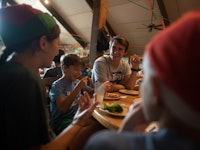
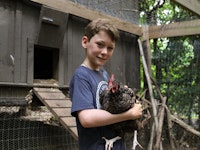
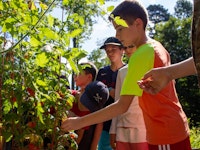
Food Service
In the dining hall, campers quickly learn to, “Take what you want, but eat what you take.” Campers and staff are asked to be mindful about what they choose to put on their plates, in order to reduce what is put in the compost bin. We also advise campers to “table shop,” asking other tables for seconds on the food they have before returning to the kitchen window for another refilled serving platter. Kitchen oils are stored and picked up by a local biofuel company to be repurposed. Our Dining Hall uses real plates, bowls, cups, and utensils at meals. Trips take bowls and utensils, and boys take reusable water bottles. Our camp cookouts use completely compostable plates, flatware, and cups. And don’t forget the Cheerwine! We recycle the cans after our cookouts. Our produce is also sourced from a local food purveyor that reduces the carbon footprint of our food delivery, and supports local farmers.
Carpooling
We encourage parents to carpool on Opening and Closing days if they know anyone coming to camp. We encourage our staff to carpool on their time off if they are leaving camp property.
Protected
Our land here at Falling Creek is blessed with several endangered species, including Green Salamanders and Pitcher Plants. Our fishing program practices catch and release fishing on our lakes and section of the Green River. No hunting is allowed on our property. Throughout the camp experience, we urge our campers and staff to remember their place in nature, and to understand that, for most of the year the camp is not occupied; it is, in effect, a natural habitat - and we expect them to keep it that way so nature thrives. In addition, we encourage them to “live green” in every aspect of their lives, in order to help sustain healthy and vibrant natural lands for other people to enjoy for centuries to come.
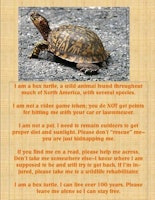
Thinking Green - Not Just At Camp
Steve Longenecker is known by many names at camp, including SFL, the “bird guy”, the “snake guy”, or even “Father Nature” for the educational wildlife programs he leads. Over his decades at camp, he has taught many campers about respecting wildlife and preserving the natural world.
He shared these wildlife infographics with us, which follow our mission of encouraging campers and staff to continue protecting nature and following green initiatives, not just at camp, but everywhere we go.
Steve said of this infographic, “Box turtles are considered special omens by many of us who have stopped on Bob’s Creek Road since the early 1970s (maybe even before then, when the road was dirt!) and moved these guys to safety. We are the “Turtle Clan”!”
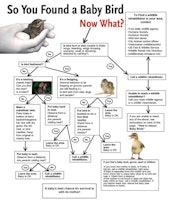
During the summer in our Nature Program, Outdoor Skills Certified, Steve’s Falconry program, and his educational snake program, campers learn more about how to respect the wildlife around us, and how to care for our natural world.